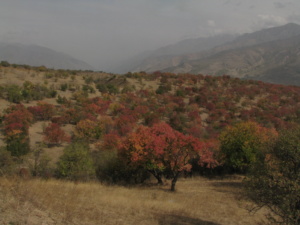 According to the classification of the Food and Agriculture Organisation (FAO) of the United Nations, Central Asian states do not have abundant forest resources. Unfavorable economic conditions and population growth are the main causes of intensive logging of existing forests. The lack of a coherent mechanism of modern management practices also contributes to the degradation of forest areas. Together, these factors worsen the living conditions of people and animals, and the stability of regional ecosystems. Therefore, particularly in today’s context of climate change, comprehensive conservation and sustainable use of forest resources are crucial.
According to the classification of the Food and Agriculture Organisation (FAO) of the United Nations, Central Asian states do not have abundant forest resources. Unfavorable economic conditions and population growth are the main causes of intensive logging of existing forests. The lack of a coherent mechanism of modern management practices also contributes to the degradation of forest areas. Together, these factors worsen the living conditions of people and animals, and the stability of regional ecosystems. Therefore, particularly in today’s context of climate change, comprehensive conservation and sustainable use of forest resources are crucial.
We aim to support our governmental and local partners in all five Central Asian countries to modify laws and regulations, and to reform relevant public agencies and other organizations working in the forestry sector. The principles of sustainable development, which promote both ecological stability and the generation of long-term socially equitable economic benefit, guide our work.
Our experts support the testing of new management approaches at the local level, and dissemination of results to the national level. Best experience are available to administrative bodies and governmental agencies through regional knowledge exchange. New methods for sustainable forest use tailored to local needs are being developed together with the population and local authorities. At the national level, we assist our partner line ministries in adapting new methods and supporting reforms that facilitate their implementation.
In Uzbekistan, joint forest management approaches are piloted in three demonstration areas of the Bobotog leskhoz of the Surkhar-Darya region, planted with pistachio trees.
Thanks to our support, forest enterprise (leskhoz) staff and local residents in Kashkadarya, Samarkand and Surkhardarya regions have increased their knowledge of joint forest management. Two pilot leskhozes have tested effective methods of land use on newly established mixed sea-buckthorn and rosehip plantations, which can be an additional source of income for local residents. At the regional level, we strive to promote the exchange of knowledge and experience between countries.
Through field visits, representatives of the forestry sector of Kazakhstan, Kyrgyzstan, Tajikistan and Uzbekistan establish mutual cooperation and get acquainted with the testing and implementation of new approaches in local contexts.